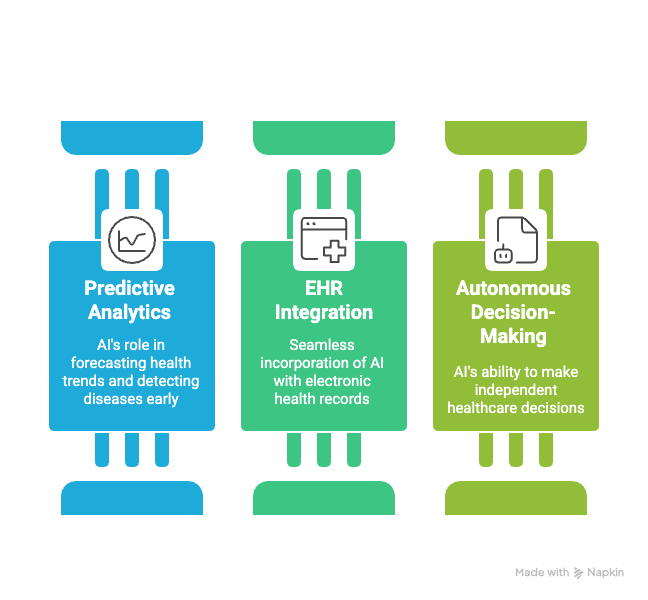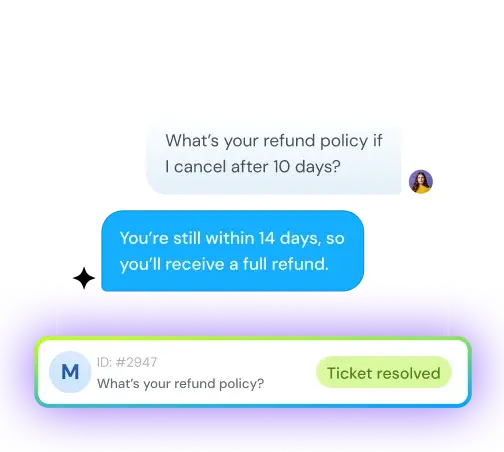The real impact of AI in healthcare industry: Expert insights for 2025
Vaishali Jayaprakash
Oct 22, 2025

AI in healthcare is moving toward a tipping point faster than ever. This change doesn't just alter healthcare operations—it revolutionizes how patients experience care.
You're probably noticing artificial intelligence in healthcare during appointment bookings or quick medical question responses. AI helps clinicians narrow down to four or five possible diagnoses, which speeds up patient results. The technology supports healthcare providers by cutting down clinician workload and creates more time for patient care.
AI's benefits go beyond saving time. The National Academy of Medicine's report highlights three major advantages: better outcomes for patients and clinical teams, reduced healthcare costs, and improved population health.
Let's explore how AI reshapes healthcare today. The technology's effects range from automated administrative work to better diagnostic precision, making a difference for both providers and patients.
How artificial intelligence is transforming healthcare operations
US healthcare spending tops $4 trillion annually, with about 25 percent going to administrative costs. The good news is that ai in the healthcare industry helps reduce this burden through smart automation and better workflows.
Automating administrative tasks
Staff members can't focus on patient care when paperwork takes up most of their day. AI in healthcare solves this problem by taking over routine tasks.
Organizations that use automation see their administrative costs drop by 25-35 percent. They save time and money through:
- Natural language tools that write clinical notes automatically
- AI assistants that turn doctor-patient talks into documentation
- Smart systems that pull billing details from medical records
Improving appointment scheduling
Empty appointment slots cost US healthcare $150 billion each year. All but one of these appointments go unfilled because patients don't show up, and primary care sees this happen up to half the time.
Smart scheduling systems powered by AI tackle this issue head-on. These systems look at patient records and other details to spot who might miss their visits, so staff can step in early.
AI makes scheduling work better for everyone. Smart reminder systems get more patients to show up, reducing no-shows.
AI does more than send reminders. It fills canceled slots right away, checks how many appointments are needed, and makes sure procedures are booked correctly. This helps healthcare providers use their time better and makes booking appointments easier for patients.
AI use in healthcare: Key patient-facing applications
Modern patients expect healthcare that's both available and tailored to their needs. The AI in healthcare industry meets these expectations through patient-facing tools that offer support, guidance, and customized care. These technologies transform how people interact with the healthcare system and make it more responsive to their needs.
24/7 virtual assistants and chatbots
AI-powered virtual assistants now provide round-the-clock access to care. These digital helpers handle tasks that once required phone calls during business hours and substantially improve patient experience. They manage appointments, provide health information, and offer simple support at any hour.
Virtual assistants deliver impressive results:
- Practices using after-hours support report up to 20% fewer missed appointments
- Patients report higher satisfaction when using AI assistants to ask health questions
- AI can automate patient interactions and free staff from administrative work
The benefits go beyond convenience. Virtual assistants can assess symptoms, offer first-aid steps, or direct patients to the nearest emergency room when urgent guidance is needed at night. These tools bridge critical gaps in care delivery and reduce unnecessary emergency visits.
AI-powered symptom checkers
Symptom checkers use artificial intelligence in healthcare to analyze patient-reported issues and suggest potential diagnoses. These digital tools involve users through conversational interfaces that let them describe their symptoms before receiving possible explanations and triage recommendations. These tools show varying results. Most people performed better than symptom checkers in clinical scenarios, though AI tools proved more reliable in identifying emergency cases. In spite of that, these systems keep improving and offer valuable preliminary guidance.
Personalized health recommendations
AI analyzes individual health data to create truly customized health advice. Artificial intelligence creates recommendations tailored to each person's unique health profile, priorities, and real-time data instead of general wellness tips.
The practical applications show promise:
- Wearable devices monitor health in real-time to ensure recommendations reflect current metrics
- AI provides tailored diet suggestions, exercise ideas, and encouragement based on individual habits
- Systems detect concerning patterns, like rising blood pressure, and prompt action before conditions worsen
Security remains a top priority in these systems. The benefits of artificial intelligence in personalized care depend on stringent security measures that protect sensitive health information and comply with data protection regulations.
A recent study of a social media forum revealed an interesting change in patient priorities. Most people asking health questions preferred responses from AI-powered chatbots over physicians' responses and ranked the chatbot's answers higher in quality and empathy. This suggests people accept AI in healthcare not just for convenience but also for its interaction quality.
3 Benefits of artificial intelligence for healthcare providers
Healthcare providers struggle with time management. Doctors spend about most of their time on EHRs and paperwork instead of caring for patients. The AI in healthcare industry offers solutions to tackle these challenges.

Reducing clinician workload
Time limits create the biggest problem for healthcare professionals. Doctors can only spend some of their working hours with patients. They spend most of their day doing paperwork. AI in healthcare helps reduce this burden in several ways:
- Digital scribes that handle clinical documentation and boost efficiency
- AI-powered inbox management tools that sort, prioritize, and handle patient messages
- Automated billing systems that match professional coders with accuracy
These tools make a real difference. This gave them more time for face-to-face patient care. The technology also helps clinicians feel more confident, which goes beyond just saving time.
Improving diagnostic accuracy
AI does more than just handle paperwork - it helps make better clinical decisions. In fact, AI boosts diagnostic processes through pattern recognition and data analysis.
AI shows impressive results in catching diseases early.
Streamlining care coordination
Patient care works best with uninterrupted teamwork. AI helps optimize information sharing and workflow management.
AI-driven care coordination gets results. AI also helps manage care pathways by creating them automatically from clinical guidelines. These systems can predict how a patient's health might change and enable early action. This helps bridge gaps between different care settings and providers.
Large language models in clinical workflows show promise too. These systems help draft patient message responses and improve doctors' well-being. This matters a lot in healthcare where burnout remains a constant challenge.
How AI improves the patient experience
Patient satisfaction depends on quick and effective healthcare service delivery. The AI in healthcare industry advances in three areas that patients care about most: shorter wait times, better diagnosis accuracy, and convenient self-service options.
Shorter wait times and faster service
Long wait times frustrate patients and put their health at risk. Patients sometimes leave without care, which creates dissatisfaction among patients and staff. AI in healthcare changes this situation.
AI-powered scheduling and triage systems help prioritize patients better and cut down wait times. Research shows that waiting times dropped from 1.97 hours to just 0.38 hours when AI ordered necessary tests before doctor visits. This cut patient waiting time by 80%.
AI also streamlines patient flow throughout medical facilities. These systems predict busy periods by analyzing patterns and distribute resources effectively.
More accurate and timely diagnoses
Better outcomes and reduced patient stress result from quick, accurate diagnoses. AI speeds up this process through advanced pattern recognition and data analysis.
The improvements in speed stand out. These tools work faster while matching or exceeding traditional methods' accuracy.
Early detection plays a crucial role in treatment success. Breast cancer found at stage one has five-year survival rates above 90%, much higher than advanced stages.
Better access to self-service tools
AI self-service tools help patients take control of their healthcare. These tools provide several benefits:
- 24/7 availability: AI chatbots support scheduling, answer health questions, and provide basic guidance
- Reduced administrative burden: AI handles pre-visit questionnaires, referrals, and appointment scheduling
- Personalized health management: AI examines wearable data to spot health risks and suggest preventive steps
AI-powered self-service kiosks streamline patient intake and collect information without paper forms. They also make appointment scheduling better by looking at available resources and patient needs, which leads to fewer missed appointments.
AI brings more than just convenience. AI chatbots handle 95% of patient questions instantly, eliminating hold times and voicemails. Patients get the information they need right away.
Expert insights: What to expect from AI in healthcare in 2025
Healthcare AI spending will hit USD 504.17 billion by 2032, marking a defining moment for the industry. This is a big deal as it means that AI capabilities are advancing faster in key areas of healthcare.
AI in predictive analytics and early detection
The predictive analytics market will grow from USD 22.22 billion in 2025 and reach USD 91.92 billion by 2032.
These tools help doctors spot disease patterns before symptoms appear. To name just one example, AI systems can spot Alzheimer's and kidney disease risks years before they show up. They can also detect 64% of epilepsy brain lesions that radiologists missed earlier.
Integration with electronic health records
EHR systems have evolved beyond simple data storage into valuable clinical partners. The EHR market continues to grow as well. Major players now smoothly combine about 100 new AI features into their platforms. These improvements include automated clinical documentation, live insights, and better coding.
The rise of autonomous AI decision-making
AI decision-making tools will become standard practice by 2026. These systems do more than follow basic commands - they learn, adapt, and fix themselves as new data comes in. Medical providers spend less time working after hours and reduced overtime. Smart AI systems will handle complete care episodes from start to finish, delivering returns for each invested dollar.
Key takeaways
AI is revolutionizing healthcare as we know it. In this piece, you can see how artificial intelligence solves fundamental problems in the healthcare system. It reduces administrative work and makes diagnoses more accurate. Both healthcare providers and patients reap the benefits of these state-of-the-art solutions.
Time savings emerge as the most important advantage. AI helps clinicians spend less time on paperwork and more time with patients. On top of that, waiting times drop when AI manages scheduling and initial assessments.
The financial effects are considerable. Healthcare organizations cut costs through AI-powered billing systems and lower administrative expenses. AI tools also save lives by spotting diseases early when treatments work best.
Patient care gets better with round-the-clock access to medical guidance, customized health advice, and self-service options. These technologies let you control your health experience while you retain control of professional oversight.
Predictive analytics will spot potential health problems before symptoms show up. EHR systems will evolve from basic data storage to active clinical partners. Autonomous AI will manage complete care episodes from beginning to end.
Healthcare is ready for this AI revolution. You'll soon have faster, more accurate, and more available care. These technologies won't take the place of human providers - they'll boost their capabilities and let them focus on what truly matters: your health and wellbeing.
Quick summary: AI in healthcare
AI is transforming healthcare by reducing administrative burdens, improving diagnostic accuracy, and enhancing patient experiences. In 2025, hospitals and clinics increasingly rely on AI tools to automate clinical documentation, streamline scheduling, and support clinicians through predictive analytics and virtual assistants. These technologies cut costs, lower clinician burnout, and improve operational efficiency allowing doctors to spend more time on patient care. Patients benefit from 24/7 AI-powered chatbots, personalized health recommendations, and faster, more accurate diagnoses. As predictive analytics and autonomous AI decision-making evolve, healthcare will shift toward proactive, data-driven care where technology augments human expertise rather than replacing it—delivering faster, safer, and more personalized outcomes for every patient.
Frequently Asked Questions
AI is used across healthcare to automate administrative work, assist with diagnostics, personalize treatment plans, and improve patient engagement. It powers virtual assistants, analyzes medical images, supports predictive care, and helps providers make faster, data-driven decisions.
The future of AI in healthcare lies in predictive analytics, autonomous clinical decision-making, and integrated EHR systems. By 2026 and beyond, AI will enable proactive care—detecting diseases early, personalizing treatments, and optimizing hospital operations for better outcomes.
No, not anytime soon. AI enhances healthcare professionals. AI handles data-heavy, repetitive tasks so clinicians can focus on complex decision-making and patient relationships, blending human empathy with technological precision.
AI is revolutionizing healthcare by automating documentation, streamlining appointment scheduling, and assisting clinicians with diagnosis and care coordination. These tools reduce costs, minimize burnout, and make patient care faster and more precise.
